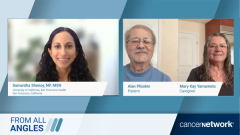
Coordinated Health Care Teams and Caregiver Support
Panelists discuss how successful talquetamab treatment requires coordinated care between inpatient and outpatient teams, comprehensive caregiver preparation including education materials and emergency contact information, and access to multidisciplinary health care providers as needed.
Episodes in this series

Alan Plisskin’s talquetamab treatment required a 10-day hospitalization for step-up dosing, facilitated by the couple's proximity to the University of California, San Francisco (UCSF) (20 to 30 minutes, depending on traffic). During his hospitalization, Plisskin had access to multidisciplinary care teams, including nurse practitioners, infusion center nurses, and specialty consultants as needed. The treatment protocol emphasized careful monitoring during the dose-escalation phase, with nurses ensuring patient stability before discharge.
Communication between inpatient and outpatient teams proved essential for smooth transitions, with comprehensive handoffs ensuring continuity of care. Mary Kay Yamamoto felt well-prepared for her caregiving role due to advance information packets and her presence during the hospital stay, allowing her to observe monitoring protocols and prepare for home care responsibilities. The health care team provided extensive resources, including phone numbers for different scenarios and clear instructions for emergency situations.
The couple received comprehensive support materials from both UCSF and the talquetamab manufacturer, creating a robust information network for managing treatment at home. Plisskin’s outpatient care involved primarily his nurse practitioner, Dr.Shenoy and infusion center nurses who were all knowledgeable about talquetamab and multiple myeloma. While Plisskin maintained relationships with other specialists, including acupuncturists, radiation oncologists, and cardiologists, only his dentist required education about the treatment, highlighting the importance of informing all health care providers about bispecific antibody therapy.
Newsletter
Stay up to date on recent advances in the multidisciplinary approach to cancer.




































